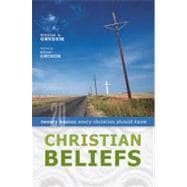
Note: Supplemental materials are not guaranteed with Rental or Used book purchases.
Purchase Benefits
What is included with this book?
| Preface | p. 9 |
| Abbreviations of Bible Books | p. 11 |
| What Is the Bible? | p. 13 |
| What Is God Like? | p. 21 |
| What Is the Trinity? | p. 37 |
| What Is Creation? | p. 43 |
| What Is Prayer? | p. 48 |
| What Are Angels, Satan, and Demons? | p. 53 |
| What Is Man? | p. 58 |
| What Is Sin? | p. 62 |
| Who Is Christ? | p. 67 |
| What Is the Atonement? | p. 72 |
| What Is the Resurrection? | p. 76 |
| What Is Election? | p. 79 |
| What Does It Mean to Become a Christian? | p. 90 |
| What Are Justification and Adoption? | p. 95 |
| What Are Sanctification and Perseverance? | p. 99 |
| What Is Death? | p. 108 |
| What Is the Church? | p. 113 |
| What Will Happen When Christ Returns? | p. 120 |
| What Is the Final Judgment? | p. 129 |
| What Is Heaven? | p. 134 |
| Historic Confessions of Faith | p. 138 |
| Books for Further Reading in Systematic Theology | p. 147 |
| Index | p. 157 |
| Table of Contents provided by Ingram. All Rights Reserved. |
The New copy of this book will include any supplemental materials advertised. Please check the title of the book to determine if it should include any access cards, study guides, lab manuals, CDs, etc.
The Used, Rental and eBook copies of this book are not guaranteed to include any supplemental materials. Typically, only the book itself is included. This is true even if the title states it includes any access cards, study guides, lab manuals, CDs, etc.
Excerpted from Christian Beliefs: Twenty Basics Every Christian Should Know by Wayne A. Grudem, Wayne Grudem
All rights reserved by the original copyright owners. Excerpts are provided for display purposes only and may not be reproduced, reprinted or distributed without the written permission of the publisher.